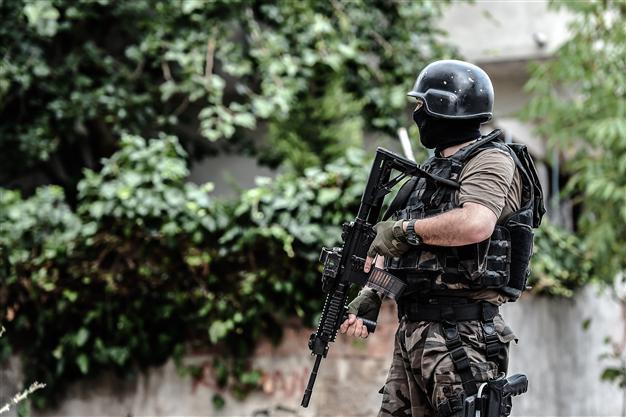BRIEF: The DHKP-C and its attacks in Turkey
ANKARA - Anadolu Agency

A Turkish special force police officer is pictured during clashes with attackers on August 10, 2015 at the Sultanbeyli district in Istanbul. AFP photo
The outlawed far-left Revolutionary People’s Liberation Party-Front (DHKP-C) group aims to destabilize Turkey by targeting the country’s key institutions and carrying out assassinations of top officials, Turkish security sources have said.
The DHKP-C has been listed as a terrorist organization by Turkey, the U.S. and the EU.
Leadership behind bars
The DHKP-C group inherited the organization, the Revolutionary Left (Dev-Sol), which had been active since 1980. It became the DHKP-C in 1994 with the leadership of Dursun Karataş. It purportedly supports Marxist-Leninist ideology and it was mostly active during the Cold War era. However, in recent years the group has revived its terrorist activities.
After the death of Karataş in 2008, a leadership crisis arose within the DHKP-C and a key group member, Hüseyin Fevzi Tekin, was seen as the new leader.
Tekin was arrested in February 2015 under a fake Bulgarian identity in an ammunition-laden safe house in Athens. He was arrested along with Murat Korkut Bilgehan and Ismail Akkol.
Among many charges, the three were also suspected of being involved in the assassination of prominent Turkish businessman Özdemir Sabancı in 1996 in Istanbul.
Tekin was also convicted on charges of possession of weapons and explosives.
Attacks targeting security forces, US
The DHKP-C has carried out a number of attacks in Turkey, including on U.S. diplomatic missions and Turkish security forces.
On Aug. 10, 2015, two suspected DHKP-C members attacked the U.S. Consulate General in Istanbul. There were no casualties.
The DHKP-C was also behind a suicide bombing at the U.S. embassy in Ankara in February 2013, which claimed the life of a Turkish security guard. The suicide bomber in the attack was identified as Ecevit Şanlı, who was registered in the northern province of Ordu.
In 2008, gunmen attacked the U.S. Consulate in Istanbul’s İstinye district on July 9, leaving three security personnel dead. Three assailants were also killed in the clash which broke out following the attack. Two suspects - Dursun Patan and Servet Çınar - were prosecuted in the case for allegedly being members of al-Qaeda.
The DHKP-C was also involved in the killing of a prosecutor, Mehmet Selim Kiraz, at a courthouse in Istanbul in March 2015.
Kiraz, 46, was taken hostage at Çağlayan courthouse, the largest in Turkey, and shot by his captors after six-hours of negotiations. The two hostage-takers, who released photographs of Kiraz with a pistol to his head during the siege, were killed by security forces.
Another attack was carried out by Elif Sultan Kalsen, a suspected member of the DHKP-C, on Istanbul’s Police Department a day after the killing of Kiraz. Kalsen was shot dead and her male accomplice was arrested shortly after the attack.
In 2013, DHKP-C members Hasan Biber and Muharrem Karataş allegedly attacked the Turkish Interior Ministry and the Justice and Development Party’s (AKP) headquarters in Ankara.
Also in 2013, suspects Karataş and Serdar Polat allegedly attacked a police building in Ankara. Karataş was shot dead after he started firing at police.
Assassination plotsOn April 16, 2015, Turkish security forces seized files belonging to DHKP-C members which allegedly showed that numerous high-ranking Turkish officials and businessmen had been designated as potential assassination targets.
According to Turkey’s Anti-Terror and Operations Office, the group’s leaders had allegedly ordered several armed attacks against Turkish military, police headquarters and national intelligence service buildings.
Moreover, the seized files detailed a plan to garner extensive coverage from Turkish and international media through such attacks.
Last month, on July 20, a suicide bombing in the southeastern town of Suruç killed 32 people who had been planning to engage in efforts to rebuild the Syrian Kurdish town of Kobane after it was devastated by clashes involving the Islamic State of Iraq and the Levant (ISIL).
The country has since witnessed a wave of bombings, shootings and arrests. Turkey has responded by arresting more than 1,300 suspected supporters of illegal groups, including ISIL, the outlawed Kurdistan Workers’ Party (PKK) and the DHKP-C.
